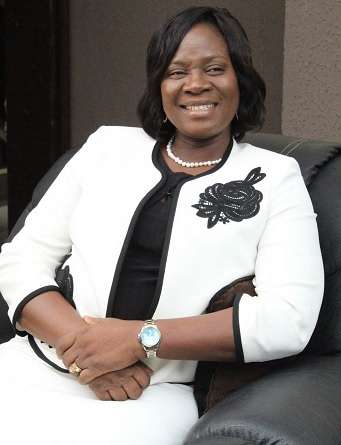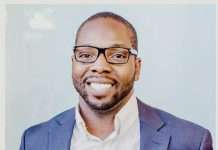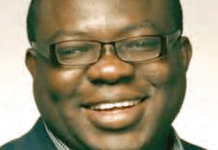
One of the most industrious and illustrious nurse leaders who have worked to advance every aspect of the nursing profession in Nigeria is Professor Prisca Olabisi Adejumo. A consummate professional and motivator, with a chronic aversion to complaining or quitting, Adejumo believes in personally finding solutions to the various challenges facing Nursing and nurses in the country. It was in recognition of her multifarious contributions to the nursing profession that she was, in July 2022, inducted into the International Nurse Researcher Hall of Fame, by the Sigma Theta Tau International Honour Society of Nursing (Sigma).
The International Nurse Researcher Hall of Fame recognises nurse researchers who have achieved significant and sustained national or international recognition for their work and whose research has actively influenced the profession and the people it serves. Among the 32 distinguished nursing professionals, who were inducted during Sigma’s 33rd International Nursing Research Congress in Edinburgh, Scotland, Adejumo was the only representative from Africa.
Describing Adejumo and the other inductees, the then Sigma President, Kenneth Dion, said: “These inspiring, world-renowned nurse researchers represent the staggering, collective impact of nursing and nursing research on global healthcare. I congratulate them on their induction into the International Nurse Researcher Hall of Fame, and I look forward to discovering more about their research journeys and experiences.”
Research exploits
Adejumo is a professor of nursing at the University of Ibadan. She is both a nurse practitioner and medical sociologist, with expertise in ethnographic and survey research, psychosocial determinants of human behaviour in health, health communication and behaviour modification.
Driven by a profound interest in interprofessional and interdisciplinary practice, education and research, Adejumo’s research interests focus on health and professional education, cancer genetics, genetic counselling and risk factors for non-communicable diseases (NCDs). She has led several research and training projects with local and international partnerships. She has also authored and co-authored over 100 books, book chapters and research publications in peer-reviewed journals.
Adejumo is a member of the competencies committee of the Consortium of Universities for Global Health. In 2004, she was selected as the principal investigator/researcher on a multi-site study of assessment and implementation of HIV/AIDS prevention activities by Ford grantee organisations (a project on analysis of community and other responses to HIV/AIDS in Africa). In 2016, her contribution to knowledge on effects of genetic nursing education on nurses’ competencies in counselling people with a family history of cancer brought a paradigm shift into oncology nursing, with genetic testing introduced into patient care at UCH, Lagos State University Teaching Hospital (LASUTH) and Lagos University Teaching Hospital (LUTH). The same is being done at other teaching hospitals within and outside Nigeria.
Adejumo is a multiple principle investigator (MPI) on the current AFREhealth (African Forum for Research and Education in Health) NIH grant. She was recently accepted into the 2021 Foundation for Advancement of International Medical Education and Research Fellowship at the FAIMER Institute.
Adejumo served as WHO consultant and project coordinator on COVID-19 Preparedness among nurses in eight countries. She is a current Global Health Competency Sub-committee member of the Consortium of Universities for Global Health (CUGH). She also served as a mentor to trainees on NIH grant and various programmes, such as leadership training programme for healthcare professionals in Africa.
Wired for impact
Interestingly, as if to foretell the colossal impact she would be having on the nursing profession, Adejumo became a nurse in a rather disruptive manner. Born in 1967, she developed an unquenchable passion for Nursing, having observed the dressing and comportment of a few nurses she encountered. The challenge, however, was that her father wanted her to study Engineering.
According to her, “My father wanted me to be an engineer; he hated nursing with a passion. He felt nurses were not given proper recognition in the society. I did GCE in form 4 and cleared all my papers. What I did for him was to run away from boarding house and apply for school of nursing. When the result of successful candidates was published in the newspaper and he saw my name there, he was surprised. He came to the hostel to look for me but didn’t meet me there because I had gone to pay the acceptance fee. There was fracas between him and the school that I was allowed to leave without his permission. He was surprised I went that far and eventually allowed me to do nursing.”
The school of nursing Adejumo got admitted into was at the University of Benin Teaching Hospital (UBTH), where she had a six-month training. She would go on to obtain her Bachelor of Science in Nursing and, later, a Master of Science in Medical Surgical Nursing in 1996 and 1999, respectively from the University of Ibadan. She then obtained a Master of Science degree in Medical Sociology in 2000 and went on to complete a doctoral in Medical Sociology and Genetics in 2011, also at the University of Ibadan.
Adejumo had her pre and post-doctoral specialised certifications in Nursing Classification and Cancer Genetics from the University of Iowa, Iowa and University of Chicago, Illinois, USA. Thereafter, she went on to obtain another doctoral in Nursing in 2016 from the University of Ibadan. She became a professor in February 2016, at the age of 47.
From bedside to academia
Years before her resumption at the Department of Nursing, University of Ibadan, Adejumo had worked as a nurse in various capacities. She served at different hospitals but mostly at the University College Hospital, Ibadan, where she rose to become head nurse in Medical Unit. As a firm believer in the notion that nurses are divinely-appointed “gatekeepers of life”, she discharged her duties so dutifully and resourcefully that she won the award of Best Nurse of the Year (1996).
Quite remarkably again, Adejumo’s decision to go into academia and ultimately reach the pinnacle of her training as a nurse practitioner and researcher, came under interesting circumstances. It was fuelled by her passion for excellence, driven the determination not to be limited, stagnated or derided. Consequently, even as she had a tremendously impactful and fulfilling career as a nurse practitioner (beginning from 1990), Adejumo kept yearning for something more challenging that would both satisfy her desire to further her education and place her on a higher pedestal of influence. Spurred by her mentors, she decided that being a nurse researcher in academia was exactly what she needed.
According to her, being an academic and nurse researcher “implies that you are not just made for the local context. You have to think like a global citizen. It puts one on a global scale to include bringing solutions to problems, de-emphasising the perception of money as a legal tender, while thinking like a global citizen; using one’s knowledge to generate more knowledge; creating opportunities to influence lives, which is a form of wealth; deliberately creating, and leaving other legacies for coming generations. Through research, an academic generates new knowledge which would be required to influence care in the clinical setting, and by extension influence clinical standards of practice.”
Over the years, Prof. Adejumo has taught various undergraduate and postgraduate courses at the University of Ibadan. She has also been a sub-dean and head of the Department of Nursing. She has mentored students in different capacities and has watched them thrive in their chosen fields.
Transgenerational influence and legacies
A few years back, Prof. Prisca Adejumo and her multi-disciplinary health professional husband, Prof. Adebayo Adejumo, founded the Focusing on Young Nurses Initiative (FYNI), with the motto: “Raising a generation of empowered nurses.” Borne out of the couple’s passion to give back to the nursing profession, the initiative is envisioned as a channel for empowering younger nurses and nursing students to navigate the nursing profession in the 21st century and beyond. This is achieved by providing platforms that educate, motivate, mentor and afford young nurses the opportunity to utilise their talents and positively impact their own lives, the lives of the patients and significant others as well as the nursing professionals.
The mission and vision of FYNI sum up the legacy that Prof. Adejumo wants to leave behind, as she consolidates her decades of exceptional contributions to the nursing profession: “To reproduce a critical mass of focused younger nursing professionals who will be well poised to take the future in their hands and be mentored by experienced experts in the various fields of nursing endeavours.” And “To be the leading and trusted career-driven professional organisation in Nigeria notable for attending solely to the personal, academic and professional development of young nurses and nursing professionals.”










